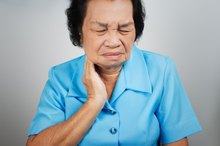Iodoral Benefits
Iodoral is an iodine supplement made and distributed by Optimox Inc., which is primarily an Internet-based company. The benefits of Iodoral for you and your family are essentially the benefits of consuming iodine, which include promoting thyroid gland health, treating iodine deficiency and possibly offsetting the damaging effects of radiation. In addition to stimulating thyroid function, iodine is promoted for its weight-loss potential because of its effect on metabolism. Too much iodine can cause side effects, so consult with your doctor before you embark on supplementation.
Iodoral
Iodoral comes in tablet form and is promoted as being one of the strongest iodine supplements on the market. Each tablet of Iodoral contains 5 mg of iodine and 7.5 mg of potassium iodide, which is a compound commonly used to iodize table salt. The suggested serving size is one to four tablets per day as recommended by a health practitioner, although one tablet contains over 8,000 percent more than the recommended dietary allowance for a 24-hour period, as cited in “Contemporary Nutrition. 1”
- Iodoral comes in tablet form and is promoted as being one of the strongest iodine supplements on the market.
- Each tablet of Iodoral contains 5 mg of iodine and 7.5 mg of potassium iodide, which is a compound commonly used to iodize table salt.
Iodine
How to Take Kelp Powder
Learn More
Iodine is an essential element necessary in trace amounts for the healthy functioning of your thyroid gland. In short, your thyroid needs iodine in order to make hormones, which include thyroxine and triiodothyronine. These hormones are needed to regulate cellular metabolism and energy production. The recommended dietary intake for iodine is 150 micrograms per day for adults, according to “Advanced Nutrition: Macronutrients, Micronutrients, and Metabolism." Too much iodine can lead to nausea and thyroid gland imbalance, but too little leads to goiter, or inflammation of the thyroid, and hypothyroidism 2.
- Iodine is an essential element necessary in trace amounts for the healthy functioning of your thyroid gland.
- In short, your thyroid needs iodine in order to make hormones, which include thyroxine and triiodothyronine.
Hypothyroidism
Long-term iodine deficiency eventually results in hypothyroidism, which is reduced hormonal output from your thyroid. Hypothyroidism leads to sluggish metabolism, weight gain, severe fatigue and colder hands and feet, as well as reduced production and sensitivity of all hormones in your body, according to “Human Biochemistry and Disease.” Iodine deficiency is relatively unusual in the United States due to iodized salt, but taking Iodoral supplements, in moderation, can treat or prevent hypothyroidism 3.
Weight Loss
Levothyroxine & Fish Oil
Learn More
Weight loss is possible from taking Iodoral supplements if you suffer from hypothyroidism or have a sluggish metabolism. However, weight loss is also a symptom of an over-active thyroid gland, in addition to a faster heart rate, oily skin and hair and bulging eyes. Consult with a health care professional to establish the correct iodine dose for yourself or family.
Balancing Hormones
According to “Nutrition and Public Health,” there appears to be a link between inadequate amounts of iodine and increased estrogen production, which can lead to fibrocystic disease of the breast and increase the risk of breast cancer 4. Iodine from Iodoral may help maintain normal breast tissue structure and function.
Protection from Radiation
All glands, especially your thyroid, are sensitive to radiation. If there is a lack of dietary iodine in your body during exposure to radiation, radioactive iodine-131 will be absorbed and accumulate in the thyroid instead. Radioactive iodine damages your thyroid, leading to inflammation, mutation and potentially cancer.
Related Articles
References
- “Contemporary Nutrition”; Gordon M. Wardlaw; 2010
- “Advanced Nutrition: Macronutrients, Micronutrients, and Metabolism”; Carolyn D. Berdanier; 2009
- “Human Biochemistry and Disease”; Gerald Litwack; 2008
- “Nutrition and Public Health”; Sari Edelstein; 2006
- American Thyroid Association. Iodine Deficiency. 2020.
- Eastman CJ, Zimmermann MB. The iodine deficiency disorders. In: Feingold KR, Anawalt B, Boyce A, et al., editors. Endotext. South Dartmouth, MA: MDText.com, Inc. Updated February 6, 2018.
- Ahad F, Ganie SA. Iodine, Iodine metabolism and Iodine deficiency disorders revisited. Indian J Endocrinol Metab. 2010;14(1):13-17.
- Kostoglou-athanassiou I, Ntalles K. Hypothyroidism - new aspects of an old disease. Hippokratia. 2010;14(2):82-87.
- American Thyroid Association. Hypothyroidism in Children and Adolescents. 2020.
- National Institutes of Health, Office of Dietary Supplements. Iodine. Updated July 9, 2019.
- U.S. National Library of Medicine. Congenital hypothyroidism. Updated February 11, 2020.
- Johnson LE. Iodine. Merck Manual Professional Version. Updated October 2018.
- Murthy MB, Krishnamurthy B. Severe irritant contact dermatitis induced by povidone iodine solution. Indian J Pharmacol. 2009;41(4):199-200. doi:10.4103/0253-7613.56069
- Puchalski AR, Chopra IJ. Radioiodine treatment of differentiated thyroid cancer despite history of 'iodine allergy'. Endocrinol Diabetes Metab Case Rep. 2014;2014:130084. doi:10.1530/EDM-13-0084
- Schabelman E, Witting M. The relationship of radiocontrast, iodine, and seafood allergies: a medical myth exposed. J Emerg Med. 2010;39(5):701-707. doi:10.1016/j.jemermed.2009.10.014
- National Institutes of Health, Office of Dietary Supplements. Iodine. Updated July 9, 2019.
- American Cancer Society. Radioactive Iodine (Radioiodine) Therapy for Thyroid Cancer. Updated March 14, 2019.
- Centers for Disease Control and Prevention. Potassium iodide (KI). Updated April 4, 2018.
- Kalra S, Unnikrishnan AG, Sahay R. The hypoglycemic side of hypothyroidism. Indian J Endocrinol Metab. 2014;18(1):1-3.doi:+10.4103/2230-8210.126517
Writer Bio
Owen Bond began writing professionally in 1997. Bond wrote and published a monthly nutritional newsletter for six years while working in Brisbane, Australia as an accredited nutritionalist. Some of his articles were published in the "Brisbane Courier-Mail" newspaper. He received a Master of Science in nutrition from the University of Saskatchewan.









